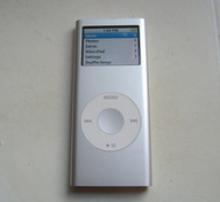It's hard to imagine, as you look at a cell phone, television, or iPod, that it represents a vast swath of environmental devastation. Sadly, the electronics industry has one of the worst environmental records.
For example, Silicon Valley which "thanks to the electronics industry is one of the most poisoned communities in the United States." IBM's internal studies found that the workers who assembled their chips had 40% more miscarriages, not to mention skyrocketing rates of cancer.
The heart of the problem is that, as Leonard puts it, "today's electronics are hard to upgrade, easy to break, and impractical to repair." Each big old clunky television (which people are ditching left and right in order to upgrade to a spiffy new flatscreen TV) has about 5 pounds of lead in it. Our electronics are incredibly toxic to produce, and incredibly toxic to dispose of.
Ever wondered where e-waste goes? I never had, until I watched this movie. Leonard actually visited Guiyu, a town in southern China which specializes in "recycling" e-waste. America ships its e-waste to Guiyu, where workers (without any protective gear) sit on the ground and break open electronics one by one. They remove the valuable metals, then cart away the rest of it and either throw it away or BURN IT. Thus releasing that "5 pounds of lead per television" into the environment along with mercury, toluene, and dozens of other horrors.
Unfortunately, the final portion of the movie is Annie's call to arms regarding "extended producer responsibility" or "product take-back." Basically saying "You made it - you deal with it." While at the same time completely overlooking the issue of personal responsibility.
Her theory is that requiring product take-back will encourage companies to design their products to last longer, be more recyclable, and less toxic. I can pretty much guarantee you the only thing that would happen is the cost would go up.
The items would be just as toxic and flimsy as always, but it would cost more to buy them, because the manufacturers would tack on a hidden "take-back fee." An extra $10 or $20 to cover their costs at the end of the item's life. When they have to take the item and pay to have it shipped to China to be dismantled and burned.
In other words, just like today, but more expensive.
Near the end, Leonard remarks that, "We are never going to shop our way out of this problem." Truer words were never spoken. If only there were an effective way to brag about not owning an iPad, or having upgraded to the latest smart phone.
Personally, I'm engaging in a one-woman war of anti-bragging. Whenever someone mentions their newest electronics toy, I whip out my 2nd generation iPod Nano (pictured above).
It doesn't play video or have wireless, it has "only" 2GB of storage space. But it works perfectly, and does everything I need it to do - and has done since I bought it new in 2006. And keeping it has saved me at least $800 over the cost of buying new ones since then!
